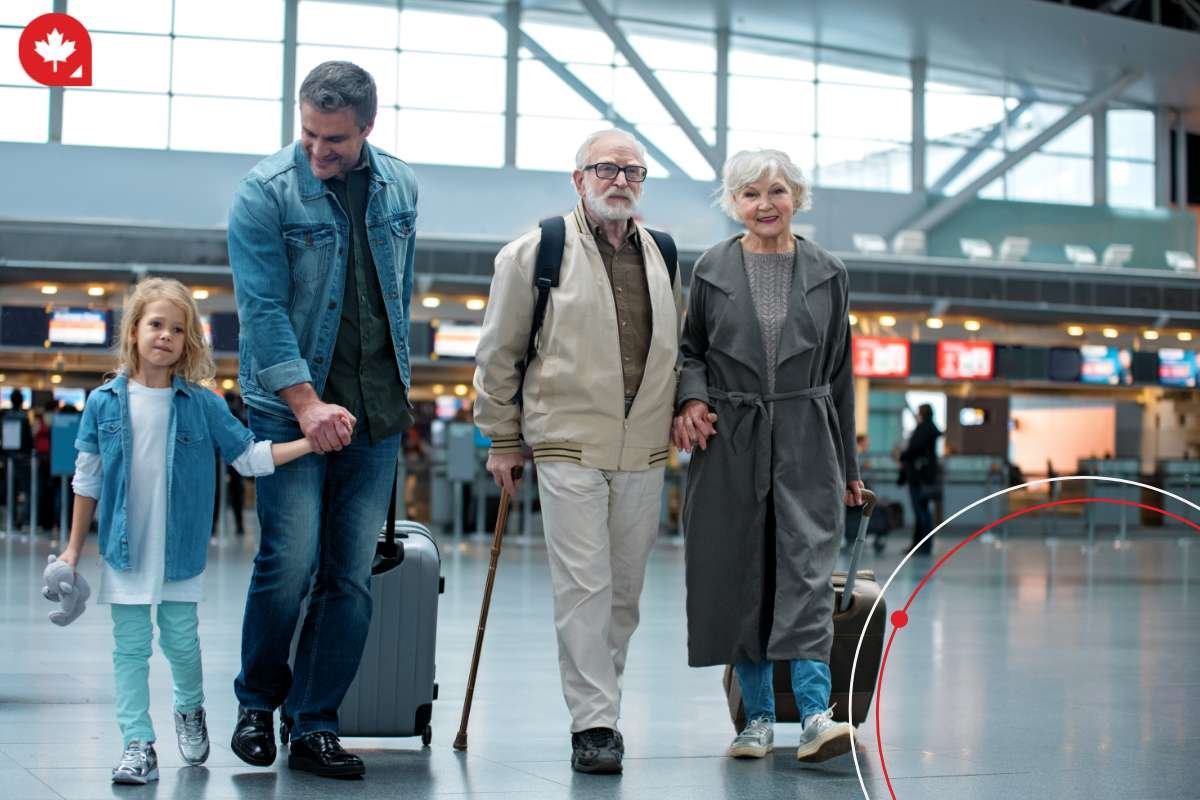Bringing your parents or grandparents to Canada is an excellent way to reunite with loved ones and share the country's beautiful lifestyle. The process can seem complex, but understanding the various immigration options will make navigating easier. One of the most common routes is through the Parent and Grandparent Sponsorship Program (PGP), which allows Canadian citizens and permanent residents to sponsor their family members for Canadian permanent residency.
Whether you're looking to sponsor them for Canadian permanent residency or want to extend their visit, we'll help you make the process as smooth as possible.
Parents and Grandparents Sponsorship Program 2025 Applications Update

If you hope to sponsor your parents or grandparents for Canadian permanent residency in Canada in 2025, you must be aware of a significant change. The Canadian government has announced that no new applications will be accepted under the Parents and Grandparents Sponsorship Program (PGP) for 2025.
Immigration, Refugees, and Citizenship Canada (IRCC) will only process applications submitted in 2024, with a maximum of 15,000 sponsorship applications processed annually. The PGP has always been highly competitive, with far more interested sponsors than available spots. The lottery system IRCC uses to issue invitations has made the process unpredictable in recent years.
How Can I Bring My Parents or Grandparents to Canada?

Reuniting with your parents or grandparents in Canada also offers them the opportunity for a better quality of life. Here's an outline of how to bring them to Canada.
Step 1: Check if You're Eligible to Apply
Before you start the process of bringing your parents or grandparents to Canada, it's essential first to check if you're eligible to sponsor them.
Who is Eligible to be a Sponsor
To be eligible, you must meet specific criteria. You must be at least 18 years old, a Canadian citizen or a permanent resident, and living in Canada. Your primary residential address must be in Canada when you apply, and you need to prove that you have enough income to support your family members during their stay.
This means providing proof of income, and if required, you can have your spouse or common-law partner co-sign the application to combine your incomes. You'll need to commit to supporting the people you're sponsoring by signing an undertaking sponsorship agreement. If you live in Quebec, there are extra steps to follow, as you'll need to submit an undertaking application to the Quebec Ministry once your application is approved.
Who Is Not Eligible to Be a Cannot Sponsor to Their Parent or Grandparent
You cannot sponsor your parents or grandparents in certain situations. If you are in jail, receiving social assistance for reasons other than a disability, or have a history of certain criminal offenses, you may be ineligible. It's important to review these requirements carefully to ensure you meet the criteria before applying.
Step 2: Who You Can or Cannot Sponsor
When sponsoring your parents or grandparents, knowing precisely who you can and cannot sponsor is important.
Who You Can Sponsor
If they're eligible, you can sponsor your biological or adopted parents and grandparents and their dependent children, such as your siblings or half-siblings. If your parents or grandparents are divorced, you can also sponsor their current spouse, common-law partner, or conjugal partner.
Remember to submit separate applications for each divorced parent. If they're separated but not divorced, you only need to submit one application since they are still considered married. When your parents or grandparents apply for Canadian permanent residency, they must provide all required forms and documents, including medical exams, police certificates, and biometrics.
Who You Cannot Sponsor
Remember that you cannot sponsor your spouse's or common-law partner's parents or grandparents (your in-laws). However, if your spouse is invited to apply (ITA), you can co-sign their in-laws' application. You cannot transfer your sponsorship invitation to someone else, including your spouse, to sponsor their parents and grandparents. Finally, you can't sponsor someone inadmissible to Canada, i.e., they cannot legally enter the country for any reason. Make sure you carefully consider these rules before moving forward with your application.
Step 3: Submit Your Interest to Sponsor Form
Please note that the interest to sponsor form is closed, so you cannot submit a new form. However, you should have received a confirmation number if you submitted an interest to sponsor form in 2020. You must save this number, as you can use it later to check if you were invited to apply for the 2024 intake. You should have also received an email confirming your submission.
Step 4: Find Out if You're Invited to Apply
If you submitted an interest to sponsor form in 2020, you may have been randomly selected to apply for the 2024 intake. Invitations were sent starting May 21, 2024, with 35,700 invitations issued over two weeks. The final application day was August 2, 2024, and the intake is now closed. If you were invited, you should have received an email with instructions. If you weren't invited, don't worry- your parents and grandparents may still be eligible for a super visa, allowing them to stay in Canada for up to five years at a time with potential extensions.
Step 5: Apply to the Program
To apply to sponsor your parents or grandparents, first ensure you've received an invitation to apply. You can't begin filling out your application until you've been invited. Once invited, you'll need to complete two applications for you as the sponsor and one for your parents or grandparents for Canadian permanent residency. Both applications must be submitted online via the Canadian Permanent Residence Portal. If you're in Quebec, check the specific requirements for sponsorship there.
Be sure to download the required forms, including the sponsorship agreement and financial evaluation, and have them signed electronically. Once completed, upload all documents, including your photos and proof of Canadian citizenship. Pay all applicable fees, including processing, biometrics, and third-party payments. After submitting, check the processing times and make sure all documents are uploaded correctly. If something is missing, you'll have 30 days to provide the necessary documents.
After submission, you'll be asked to provide additional information such as medical exams, police certificates, and biometrics for your parents or grandparents. Remember, any delays in submitting the required documents can result in your application being returned, so make sure everything is in order before submitting.
Step 6: Prepare For Your Sponsored Parent or Grandparent's Arrival to Canada
Once your parents or grandparents' application is approved, it's time to prepare for their arrival in Canada. If they're already in Canada, they'll receive instructions on confirming their permanent resident status through the Canadian Permanent Residence Portal. Sometimes, they may need an in-person interview, and we'll provide details about the documents they must bring. You can start preparing with free pre-arrival services if your family members are outside Canada. These services will help them understand life in Canada, learn English or French, and connect with the community.
When your family arrives at the Canadian border, they must present their Confirmation of Permanent Residence, passport, and other documents we provided. The border services officer will check their documents and ensure they meet the requirements. Be sure to remind them to keep their important documents handy, not packed in luggage. If everything is in order, they will be allowed entry as permanent residents and their permanent resident card will be mailed to them.
Benefits of Moving to Canada With Your Parent or Grandparent

Bringing your parents or grandparents to Canada can be an enriching experience, offering a unique blend of familial and personal benefits. Let's take a closer look at the benefits of bringing your parents or grandparents to the Great White North.
Strengthening Family Bonds
One of the most significant benefits of bringing your parents or grandparents to Canada is the opportunity to strengthen family bonds. Living nearby allows for daily interactions, shared experiences, and the invaluable support system of intergenerational living. This can be particularly beneficial for raising children, as grandparents can provide a wealth of wisdom, childcare assistance, and a strong sense of family history and tradition.
Enhanced Support and Care
Bringing your parents or grandparents to Canada can give them the support and care they need as they age. Canada offers a comprehensive healthcare system, including access to quality medical care, social programs, and a safe and secure environment. This can be particularly important for elderly individuals who require assistance with daily living activities or have specific health concerns.
Cultural Enrichment and Shared Experiences
Relocating to Canada with your parents or grandparents can enrich the lives of both generations through cultural exchange and shared experiences. Canadian family members can learn about their family's heritage, traditions, and language. At the same time, parents and grandparents can experience a new culture, explore new opportunities, and enjoy a higher quality of life.
Economic Benefits
Besides the emotional and social benefits, bringing your parents or grandparents to Canada can also have economic advantages. In some cases, parents and grandparents may contribute to the household income through employment or providing childcare services, which can help reduce childcare costs for Canadian families. The presence of older family members can contribute to the overall economic vitality of the community by supporting local businesses and participating in community activities.
Personal Growth and Fulfillment
The decision to bring your parents or grandparents to Canada can be a deeply personal and fulfilling experience. It can provide an opportunity to give back to those who have nurtured and supported you. This act of love and compassion can bring a sense of purpose and fulfillment, knowing that you have positively impacted the lives of your loved ones.
FAQs
What Are the Common Challenges Faced by Sponsors?
Common challenges sponsors face include insufficient planning, leading to ineffective sponsorship sales, and lack of client support, which can hinder the visibility and success of sponsorship initiatives. Sponsors often struggle to create diverse sponsorship packages, limiting their chances of attracting a wider range of potential partners.
How Long Does it Take to Process a Sponsorship Application?
The processing time for a sponsorship application can vary significantly, but it typically takes several months due to the need for thorough documentation and compliance with eligibility criteria. Factors such as the volume of applications and the specific immigration program being applied for can further influence this timeline.
Learn more about IRCC processing times.
What Are the Alternatives to The Parent and Grandparent Program?
Alternatives to the PGP for Canadian immigration include the Super Visa, which allows parents and grandparents to visit Canada for extended periods without permanent residency. Other pathways may involve Express Entry or Provincial Nominee Programs (PNPs), which can provide different routes for family reunification without relying solely on the PGP lottery system.




